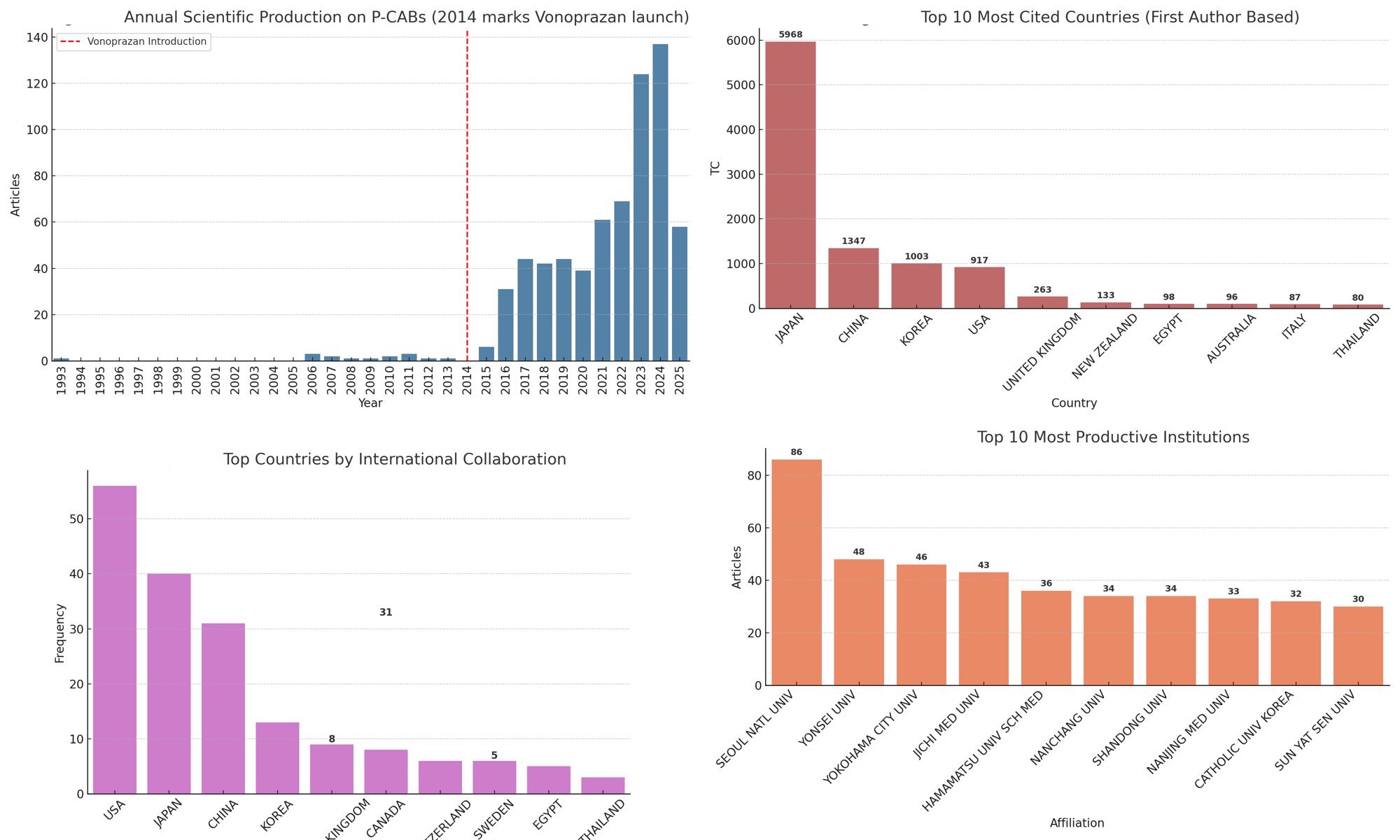Sunday Poster Session
Category: Stomach and Spleen
P2046 - Mapping a Global Decade of Potassium-Competitive Acid Blockers Use: Geographic and Temporal Disparities in Scientific Productions
Sunday, October 26, 2025
3:30 PM - 7:00 PM PDT
Location: Exhibit Hall

Renan Prado, MD
Cleveland Clinic Foundation
Cleveland, OH
Presenting Author(s)
Renan Prado, MD1, Arjun Chatterjee, MD2, Zehra Naseem, MD1, Mohamad Mahdi Osman, DO3, Akash Khurana, MD2, Leandro Sierra, MD4, Stephen Firkins, MD2
1Cleveland Clinic Foundation, Cleveland, OH; 2Gastroenterology and Hepatology, Cleveland Clinic, Cleveland, OH; 3Cleveland Clinic, Cleveland, OH; 4Department of Internal Medicine, Cleveland Clinic, Cleveland, OH
Introduction: Potassium-competitive acid blockers (P-CABs), including vonoprazan, tegoprazan, and fexuprazan, have emerged as potent alternatives to proton pump inhibitors for acid-related disorders, particularly GERD and H. pylori eradication. Vonoprazan was first approved in Japan in February 2015, followed by the United States in November 2023. Despite their increasing adoption in clinical practice, the scientific literature surrounding P-CABs shows imbalanced growth across countries.
Methods: A bibliometric analysis was conducted using the Web of Science Core Collection. Articles and reviews from 1993 to 2025 were included, excluding meeting abstracts. Only 15 publications were prior to 2015, with 655 from 2015 to 2025. Bibliometric indicators were computed using the Bibliometrix R-package. Parameters analyzed included annual production, most cited works, corresponding author countries, and institutional productivity.
Results: A total of 670 P-CAB–related documents were published across 206 sources, with an annual growth rate of 13.53%. Research output rose steeply after 2014, correlating with the introduction of vonoprazan. Japan led all countries with 242 publications, followed by China (158), South Korea (100), and the USA (54). These four nations contributed the majority of scientific output (85.1%). The most prolific journals were Alimentary Pharmacology & Therapeutics (49 articles), Helicobacter, and Digestion. The most cited article was published in Gut (2016), with 507 citations, about vonoprazan for H. pylori treatment. Among the top 10 most cited articles, 8 were from Japan and 2 from multinational collaborations involving Asia and the USA. Institutions such as Seoul National University and Yonsei University were among the most represented. Japan, as the most cited first-author country, accounted for nearly 6,000 citations.
Discussion: Research on P-CABs has expanded rapidly in the past decade, driven primarily by East Asian countries, especially Japan. However, global engagement remains limited, with low participation from developing nations. Strengthening international collaboration and promoting broader access to P-CAB research will be key to achieving a more balanced and globally relevant scientific discourse.

Figure: Temporal, Geographic and Institutional Evaluation of Potassium-Competitive Acid Blockers Publications
Disclosures:
Renan Prado indicated no relevant financial relationships.
Arjun Chatterjee indicated no relevant financial relationships.
Zehra Naseem indicated no relevant financial relationships.
Mohamad Mahdi Osman indicated no relevant financial relationships.
Akash Khurana indicated no relevant financial relationships.
Leandro Sierra indicated no relevant financial relationships.
Stephen Firkins indicated no relevant financial relationships.
Renan Prado, MD1, Arjun Chatterjee, MD2, Zehra Naseem, MD1, Mohamad Mahdi Osman, DO3, Akash Khurana, MD2, Leandro Sierra, MD4, Stephen Firkins, MD2. P2046 - Mapping a Global Decade of Potassium-Competitive Acid Blockers Use: Geographic and Temporal Disparities in Scientific Productions, ACG 2025 Annual Scientific Meeting Abstracts. Phoenix, AZ: American College of Gastroenterology.
1Cleveland Clinic Foundation, Cleveland, OH; 2Gastroenterology and Hepatology, Cleveland Clinic, Cleveland, OH; 3Cleveland Clinic, Cleveland, OH; 4Department of Internal Medicine, Cleveland Clinic, Cleveland, OH
Introduction: Potassium-competitive acid blockers (P-CABs), including vonoprazan, tegoprazan, and fexuprazan, have emerged as potent alternatives to proton pump inhibitors for acid-related disorders, particularly GERD and H. pylori eradication. Vonoprazan was first approved in Japan in February 2015, followed by the United States in November 2023. Despite their increasing adoption in clinical practice, the scientific literature surrounding P-CABs shows imbalanced growth across countries.
Methods: A bibliometric analysis was conducted using the Web of Science Core Collection. Articles and reviews from 1993 to 2025 were included, excluding meeting abstracts. Only 15 publications were prior to 2015, with 655 from 2015 to 2025. Bibliometric indicators were computed using the Bibliometrix R-package. Parameters analyzed included annual production, most cited works, corresponding author countries, and institutional productivity.
Results: A total of 670 P-CAB–related documents were published across 206 sources, with an annual growth rate of 13.53%. Research output rose steeply after 2014, correlating with the introduction of vonoprazan. Japan led all countries with 242 publications, followed by China (158), South Korea (100), and the USA (54). These four nations contributed the majority of scientific output (85.1%). The most prolific journals were Alimentary Pharmacology & Therapeutics (49 articles), Helicobacter, and Digestion. The most cited article was published in Gut (2016), with 507 citations, about vonoprazan for H. pylori treatment. Among the top 10 most cited articles, 8 were from Japan and 2 from multinational collaborations involving Asia and the USA. Institutions such as Seoul National University and Yonsei University were among the most represented. Japan, as the most cited first-author country, accounted for nearly 6,000 citations.
Discussion: Research on P-CABs has expanded rapidly in the past decade, driven primarily by East Asian countries, especially Japan. However, global engagement remains limited, with low participation from developing nations. Strengthening international collaboration and promoting broader access to P-CAB research will be key to achieving a more balanced and globally relevant scientific discourse.

Figure: Temporal, Geographic and Institutional Evaluation of Potassium-Competitive Acid Blockers Publications
Disclosures:
Renan Prado indicated no relevant financial relationships.
Arjun Chatterjee indicated no relevant financial relationships.
Zehra Naseem indicated no relevant financial relationships.
Mohamad Mahdi Osman indicated no relevant financial relationships.
Akash Khurana indicated no relevant financial relationships.
Leandro Sierra indicated no relevant financial relationships.
Stephen Firkins indicated no relevant financial relationships.
Renan Prado, MD1, Arjun Chatterjee, MD2, Zehra Naseem, MD1, Mohamad Mahdi Osman, DO3, Akash Khurana, MD2, Leandro Sierra, MD4, Stephen Firkins, MD2. P2046 - Mapping a Global Decade of Potassium-Competitive Acid Blockers Use: Geographic and Temporal Disparities in Scientific Productions, ACG 2025 Annual Scientific Meeting Abstracts. Phoenix, AZ: American College of Gastroenterology.
